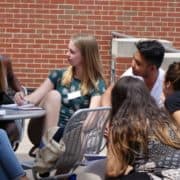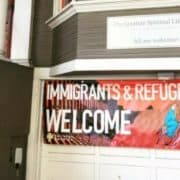BY KELLY SWAN | August 7, 2017
“Compassion is the virtue of suffering with—imagining what it is like to be in another’s shoes.”
[Fr. Dan Reim, SJ]
For four days in late July, thirty-eight Jesuit college and university students gathered, brought together by a shared capacity for compassion, for the Ignatian Justice Summit.

Students from fourteen Jesuit colleges and universities gathered near Cleveland, OH in late July for ISN’s Ignatian Justice Summit.
The Summit, facilitated by the Ignatian Solidarity Network and held on the campus of John Carroll University in University Heights, OH, drew participants from fourteen Jesuit schools—Boston College, Canisius College, College of the Holy Cross, Creighton University, Georgetown University, John Carroll University, Loyola Marymount University, Loyola University Chicago, Loyola University Maryland, Rockhurst University, Saint Louis University, Saint Peter’s University, Saint Joseph’s University, and Xavier University—throughout the U.S. to connect, educate, and network for immigration justice.

José Cabrera (left) speaks with a fellow Ignatian Justice Summit participant.
José Cabrera, a student at Xavier University, was energized by his fellow participants who are “ready to fight for an issue that they might not be directly affected by.” Cabrera works with Intercommunity Justice and Peace Center in Cincinnati, OH as an immigration program organizer, developing young leaders for immigration rights. Cabrera has been an immigration activist for many years, and is himself a Deferred Action for Childhood Arrivals (DACA) recipient. “The Summit gave me the tools to say ‘this is part of our Jesuit values’: it’s not just [working for justice] for me or for other immigrants, but it is what our Jesuit mission and the Jesuit values are about.”
Partners from the Jesuit network brought specific expertise and experience on immigration issues. Marcos Gonzales, S.J., case manager and local organizing committee member at Homeboy Industries, grounded the Summit in the Ignatian tradition. Gonzalez drew students into a deeper understanding of immigration justice, Ignatian spirituality, and exploration of their own personal faith and history in their own work for justice.

Marcos Gonzales, SJ, guides participants through reflection and discussion on seeking justice through an Ignatian lens.
Miriam Uribe, a 2017 University of San Francisco graduate who is both undocumented and an advocate for the undocumented community, joined participants at the Summit as a powerful voice in the week’s conversations about migration.

Miriam Uribe at the Ignatian Justice Summit.
As part of a panel discussion on Jesuit network innovation, Uribe outlined her success in planning and implementing a campus “UndocuWeek” at the University of San Francisco. The event celebrated and highlighted the struggles of the undocumented community, serving as a call to action for both individuals and institutions to uphold Jesuit values and stand up to injustices faced by undocumented people.
Uribe was joined on the panel by Flavio Bravo, a Loyola University Chicago graduate who, as a student, worked to pass the Magis Scholarship fund for undocumented students. Natalie Terry also shared the work of St. Agnes Parish in San Francisco, a Jesuit sanctuary parish sponsoring a refugee family in their community.

Students participate in a social justice incubator session, sharing innovative responses to immigration and other social justice issues on their campuses to promote network-wide collaboration and spark new ideas.
Uribe also shared her own immigration story during a policy briefing with Kristen Lionetti, policy director for the Jesuit Conference’s advocacy office and Joanna Williams, director of education and advocacy at the Kino Border Initiative in Nogales, AZ. “Storytelling was vital to the Summit experience,” shares Uribe, specifically referencing those students whose exposure to immigration issues and immigrants themselves is minimal. “Having a personal connection to someone’s story humanizes the issue.”

Students discuss immigration issues on their campuses.
“I was nervous coming into this program as a facilitator,” shares Uribe. “I was afraid that students might be disinterested, particularly those who are new to immigration issues. But after each presentation, students approached me with questions and for feedback on ideas for their own campuses.” On the experience of connecting with a diverse group of students at the Summit, Uribe shares that she “wishes that this opportunity had existed a few years ago. This network would have made such an impact on me during my first two years of college. I would have been less lonely, knowing that people are working as allies. It is so encouraging that action is being taken at all of these schools across the country.”

Sabrina Blakely discusses her delegation’s action plan with Summit participants from other schools.
Sabrina Blakely, a student at St. Joseph’s University, was one student who arrived at the Summit with great compassion for those who migrate, but very little practical knowledge. She had spent time with her sister who lives in a Catholic Worker community that serves as a safe home for immigrants in Houston. “I felt like I was standing in solidarity with the community of immigrants, but I didn’t know what I could be doing on the ground,” she explains. “I’m grateful for learning what our policies are, what is happening currently, and having someone break it down in a way that was accessible for me. Although I’m not in position to dedicate my entire life to living in a safe home like my sister does, there are ways I can live out the Gospel in the context of my life and where I am right now.” Blakely found advocacy training to be particularly useful. “I learned how to simply call my senator, what to say—getting over that small fear of doing that.”
As the Summit came to a close, energy was high as students from each school shared action plans with the group. Many students had already reached out to peers, administrators, and faculty members at their schools to clarify policies, pitch ideas, and learn more about current realities for students at their schools who are immigrants. Ideas centered around ways to increase dialogue and storytelling with campus communities, events promoting awareness and action on immigration issues, and scholarship programs for undocumented students, amongst others.
“The most important thing for me is remembering that this is the work of the Gospel,” shared Blakely before departing. At closing Mass, Fr. Dan Reim, S.J., a campus minister at St. Ignatius High School in Cleveland, issued a challenge to Summit attendees in light of the day’s Gospel reading, focused on the seed sown among thorns: “To make a seed grow into something fruitful takes time and a lot of hard work. Is your compassion deep enough to motivate you to navigate the thorns?”
Editor’s Note: This piece was originally published as part of the Ignatian Solidarity Network News From the Network series.
Kelly Swan has worked for the Ignatian Solidarity Network since 2016, first as communications director, and now as director of advancement. She grew up in West Virginia and is a graduate of Wheeling Jesuit University. Kelly has worked in parish social ministry, child and family advocacy, community education and organizing, and publishing. She lives in the Cleveland, Ohio area with her children.




